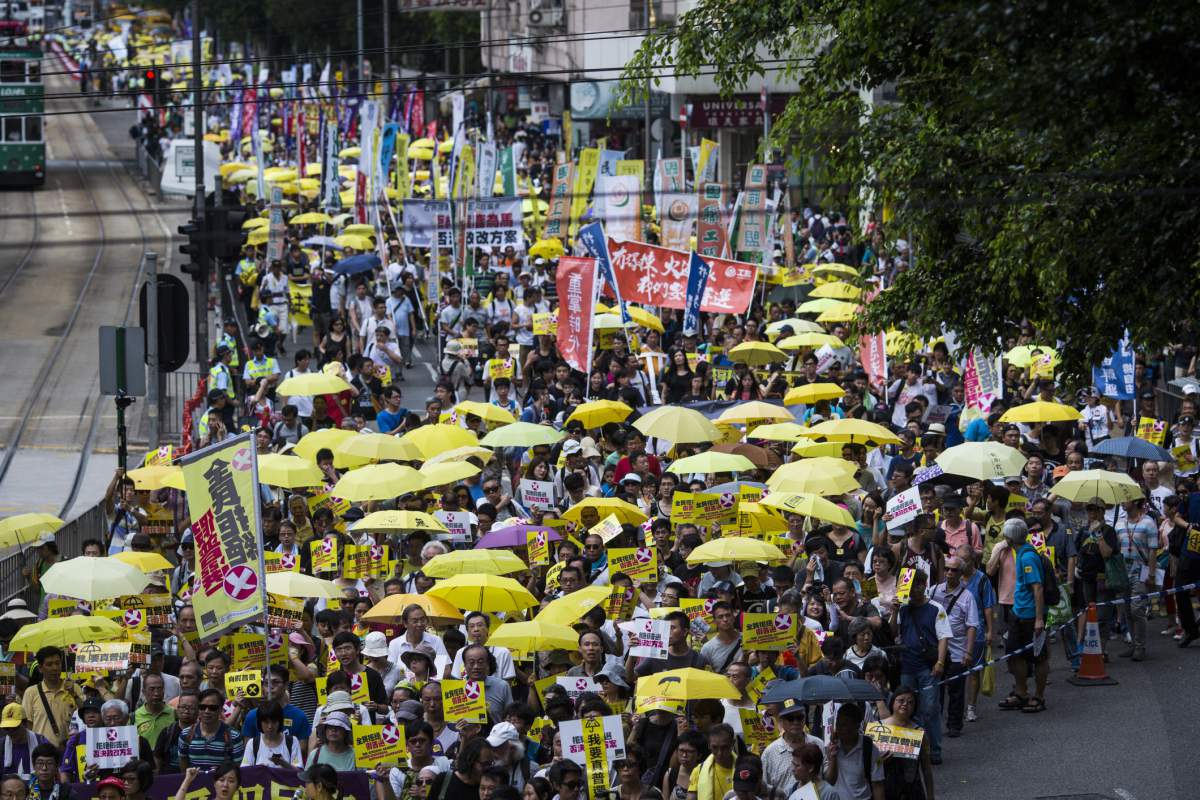Reuters’ Venus Wu and Hera Poon report on the sentencing of three student leaders behind the 2014 “Umbrella Movement” protests in Hong Kong:
Teenage activist Joshua Wong, 19, was given 80 hours of community service for unlawful assembly after he and others stormed into a fenced-off area in front of government headquarters called “Civic Square” to stage a sit-in in September 2014.
That sparked a night-long standoff with police and was seen as a key trigger for the “Umbrella Movement” that blocked major roads in the Chinese-ruled city for 79 days in a push for full democracy, presenting Communist Party rulers in Beijing with one of their biggest political challenges in decades.
[…] Alex Chow, 25, was given a three-week prison sentence but granted a reprieve for graduate studies in the United Kingdom.
Nathan Law, 23, who was found guilty of the more serious charge of inciting others to unlawful assembly, was given 120 hours of community service. [Source]
Chow is unlikely to serve any prison time: his sentence was reportedly changed from 80 hours of community service in order to accommodate his study plans.
The three had faced up to two years in prison. Any sentence longer than three months would have made Law ineligible to run in legislative elections next month. At least five candidates have already been excluded for allegedly rejecting Chinese rule over Hong Kong.
At South China Morning Post, Jasmine Siu reported on the court’s reasoning for the relatively light punishments:
The magistrate said the court had to consider the motives and intentions behind the offence as the case was atypical from other criminal cases. She said the defendants expressed their demands based on their genuinely held political ideals or concern for society.
“If their actions did not originate from personal gain or intent to harm others, the court should not only consider their actions and the consequences, but also try to understand the motivations behind their offence by adopting a more lenient and understanding attitude,” she said.
[…] “The three defendants’ actions were undoubtedly reckless, but they were not very violent nor intentional in harming security guards or police officers,” she continued. “They only wanted to enter the east wing forecourt, the Civic Square with a historical and symbolic meaning that they genuinely believe in, to form a circle and chant slogans.”
Chow said outside court he found the ruling powerful. He described it as a a wake-up call to those in power as well as an important warning to the community that one must always consider the motives and political stances behind Hong Kong’s different voices. [Source]
A statement from Human Rights Watch criticized the ruling, however:
“In sentencing these students, Hong Kong authorities’ behavior increasingly resembles that of their counterparts in Beijing,” said Sophie Richardson, China director. “Leading peaceful protests is no crime, and the charges against the three should be dropped.”
[…] Hong Kong has a longstanding tradition of tolerating peaceful demonstrations, but recent reports suggest an increasing number of arrests and prosecutions against protesters, some under the Public Order Ordinance. Beyond the unjust punishment faced by Wong, Chow, and Law, the prosecutions send a broader message to Hong Kong society about participation in peaceful public protest.
“If students are going to get prosecuted for ‘unlawful assembly,’ what other behavior is now off limits, and will people think twice before exercising their rights to peaceful expression?” Richardson said.
[…] “Hong Kong’s future depends on authorities devoting their energies to upholding – not reducing – civil and political rights,” Richardson said. “These prosecutions and sentences should unnerve anyone who cares about the fate of basic rights in Hong Kong.” [Source]
On the mainland, four activists were sentenced in April to up to four and a half years in prison for unfurling banners and posting online comments in support of the Umbrella protests. More recently, Wong was featured in a video warning of foreign efforts to foment a Chinese “Color Revolution” that was shared on Weibo by the Supreme People’s Procuratorate.








